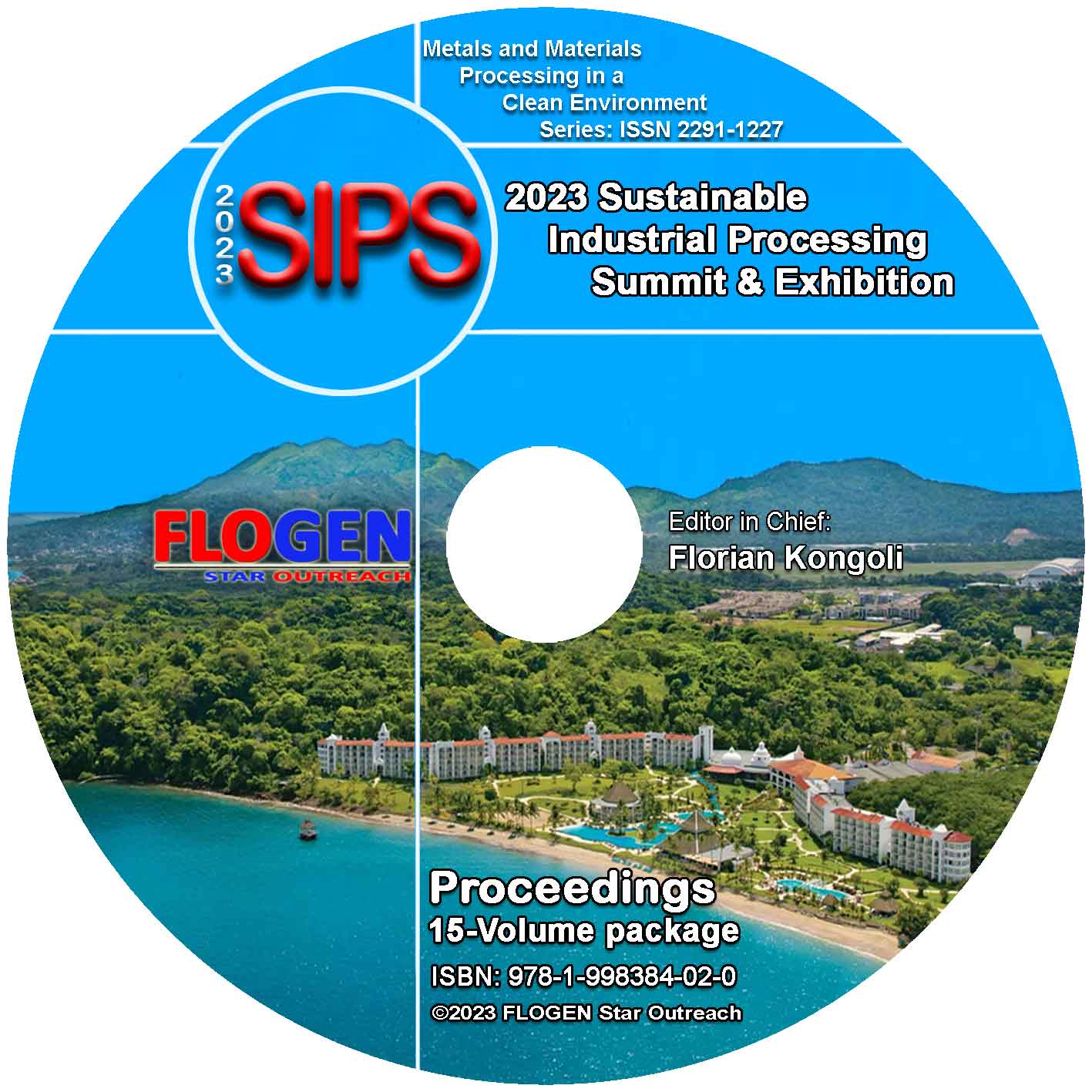2023-Sustainable Industrial Processing Summit
SIPS2023 Volume 6. Kumar Intl. Symp. / Secondary Battery Manufacturing & Recycling
| Editors: | F. Kongoli, K. Aifantis, C. Capiglia, A. Fox, R. Yazami, A. U. H. Qurashi |
| Publisher: | Flogen Star OUTREACH |
| Publication date: | 21 December 2023 |
| Pages: | 90 pages |
| ISBN: | 978-1-989820-82-7 (CD) |
| ISSN: | 2291-1227 (Metals and Materials Processing in a Clean Environment Series) |

CD shopping page
FUTURE PRESPECTIVES FOR SUSTAINABLE RECYCLING OF LABs AND LIBs
M. Seref Sonmez1;1ISTANBUL TECHNICAL UNIVERSITY, Istanbul, Turkey;
Type of Paper: Regular
Id Paper: 194
Topic: 14
Abstract:
Recycling and reuse of batteries has increased its importance in recent years. In this study, recycling strategies of both lead acid batteries (LABs) and lithium-ion batteries (LIBs) were investigated comprehensively. Pyrometallurgical processes such as smelting and carbothemic reduction and hydrometallurgical processes such as desulphurisation and electrowinning were evaluated in detail for the recovery of lead in spent lead acid batteries [1-3]. Effects of the battery structure and recycling technologies such us hydrometallurgical, bio-hydrometallurgical and solvo-metallurgical methods on the energy and sustainability of lithium ion batteries were discussed [4]. Opportunities, challenges, and future prospects for the recycling of lead acid batteries and lithium ion batteries were evaluated. Recycling plays an important role for the sustainability of lead acid batteries and lithium ion considering the battery characteristics, environmental issues and critical raw materials. Green sustainable recycling and circular economy were emphasized for spent batteries [5-7]. Future perspectives for sustainable recycling of both lead acid batteries and lithium ion batteries were outlined.
Keywords:
Li-Ion; Recycling; Sustainability; SynthesisReferences:
[1] M.S. Sonmez, R.V. Kumar, Leaching of waste battery paste components. Part 1: Lead citrate synthesis from PbO and PbO2, Hydrometallurgy, 95, 1–2, 2009, 53-60 (https://doi.org/10.1016/j.hydromet.2008.04.012.).[2] M.S. Sonmez, R.V. Kumar, Leaching of waste battery paste components. Part 2: Leaching and desulphurisation of PbSO4 by citric acid and sodium citrate solution, Hydrometallurgy, 95, 1–2, 2009, 82-86, (https://doi.org/10.1016/j.hydromet.2008.04.019).
[3] Hengyu Pan, Yong Geng, Huijuan Dong, Mustafa Ali, Shijiang Xiao, Sustainability evaluation of secondary lead production from spent lead acid batteries recycling, Resources, Conservation and Recycling, 140, 2019, 13-22, (https://doi.org/10.1016/j.resconrec.2018.09.012).
[4] LÃvia Salles Martins, Lucas Fonseca Guimarães, Amilton Barbosa Botelho Junior, Jorge Alberto Soares Tenório, Denise Crocce Romano Espinosa, Electric car battery: An overview on global demand, recycling and future approaches towards sustainability, Journal of Environmental Management, 295, 2021, 113091, (https://doi.org/10.1016/j.jenvman.2021.113091).
[5] Ersha Fan, Li Li, Zhenpo Wang, Jiao Lin, Yongxin Huang, Ying Yao, Renjie Chen, and Feng Wu, Sustainable Recycling Technology for Li-Ion Batteries and Beyond: Challenges and Future Prospects, Chemical Reviews 2020 120 (14), 7020-7063, (DOI: 10.1021/acs.chemrev.9b00535).
[6] Jędrzej Piątek, Semih Afyon, Tetyana M. Budnyak, Serhiy Budnyk, Mika H. Sipponen, Adam Slabon, Sustainable Li-Ion Batteries: Chemistry and Recycling, Adv. Energy Mater. 2021, 11, 2003456, (DOI: 10.1002/aenm.202003456).
[7] Joseph Jegan Roy, Saptak Rarotra, Vida Krikstolaityte, Kenny Wu Zhuoran, Yang Dja-Ia Cindy, Xian Yi Tan, Michael Carboni, Daniel Meyer, Qingyu Yan, and Madhavi Srinivasan, Green Recycling Methods to Treat Lithium-Ion Batteries E-Waste: A Circular Approach to Sustainability, Adv. Mater. 2022, 34, 2103346, (DOI: 10.1002/adma.202103346).